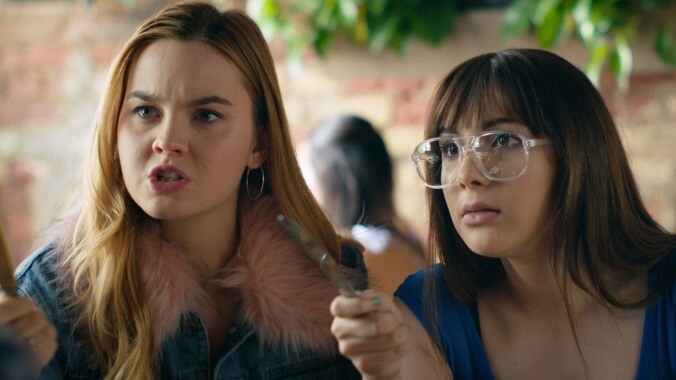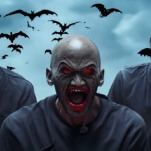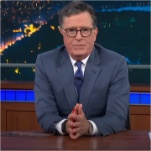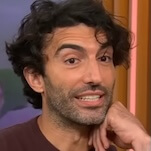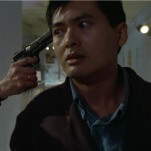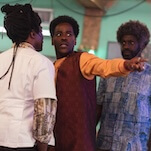They do everything together, and give each other nicknames: April is “Brad Pitt” and Clara is “George Clooney.” For whatever reason, they decided to keep their friendship secret from Nick. If that doesn’t sound like much of a conflict to hang a movie on, it’s because it isn’t. Time and again, Banana Split visibly strains to fill out its modest running time. Frequently, it succumbs to repetition, backtracking over the same handful of plot points or dragging them through cutesy montages and fantasy and dream sequences. Kasulke, whose long resume as an indie cinematographer includes several films by Guy Maddin and Lynn Shelton, doesn’t bring much visual wit to these scenes—just the same clean, fussed-over spaces and flat-against-the-wall symmetries familiar from dozens of coming-of-age films produced since the mid-2000s.
In fact, apart from some light vaping, Banana Split could have really been set at any point since the advent of social media. The teen-movie tropes it regurgitates are hardly new. April has the requisite harried, oversharing single parent (Jessica Hecht); hopelessly dorky male friend (Luke Spencer Roberts); “boring” summer job (selling concessions at an arthouse theater); and bratty, foul-mouthed younger sibling (Addison Riecke). (If you enjoy hearing a tween say “Suck my dick” and “Eat my ass” over and over, then this is a movie for you.) Clara, in the meantime, doesn’t get much of a background, apart from some humble origins (she’s from Fresno) and a degree of sexual experience that pries at April’s pro-forma insecurities.
At least the soundtrack choices are above average—though one wonders why these decidedly un-subcultural Zoomers seem to have the musical taste of a thirty-to-forty-something ex-hipster. (Do we really believe that they’d be listening to Psychic TV and X-Ray Spex?) Of course, plenty of movies about young people—including some of the great ones—exist in a bubble of high artificiality. They are filled with characters who deliver sassy comebacks that the writers have been mentally workshopping since high school. These characters have some of the quirkiness and self-pity of real teenagers, but with clear skin, a coordinated wardrobe, and well-conditioned hair.
The problem with Banana Split isn’t the surface phoniness or lazy comedy but the fact that the movie doesn’t offer any insight into its ostensible subjects—among them break-ups, female friendship, and teenage jealousy. Instead, it simply coasts on the extreme professionalism of the cast, which is almost a given considering that all three leads have been playing high schoolers for at least a decade. While their teen characters aren’t exactly believable, they are also rarely annoying. Perhaps that’s the one advantage they have over the real thing.
